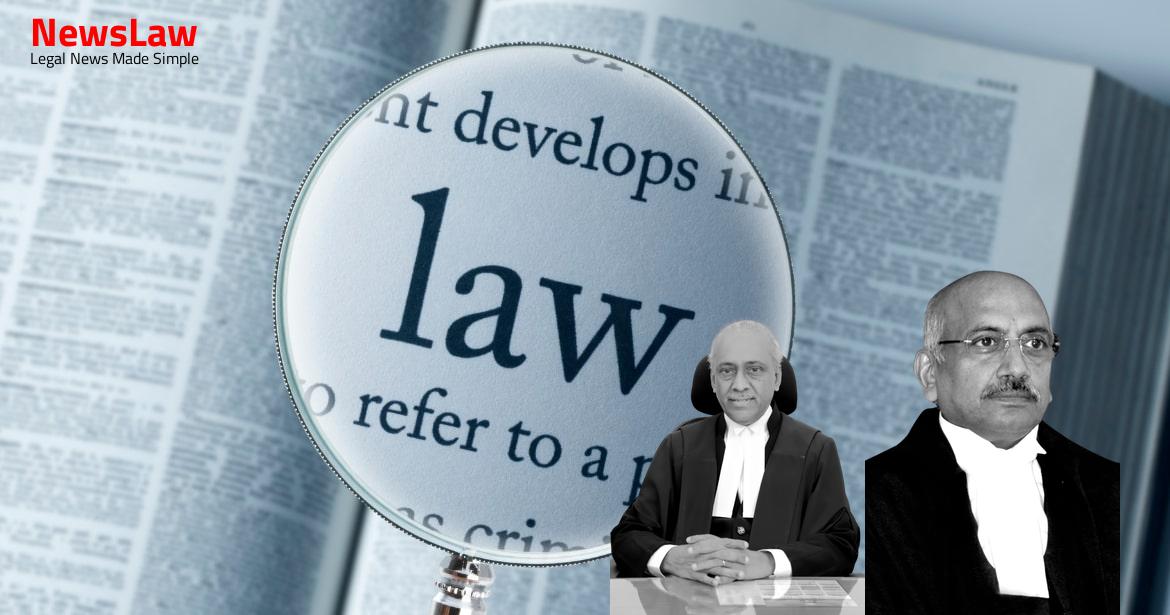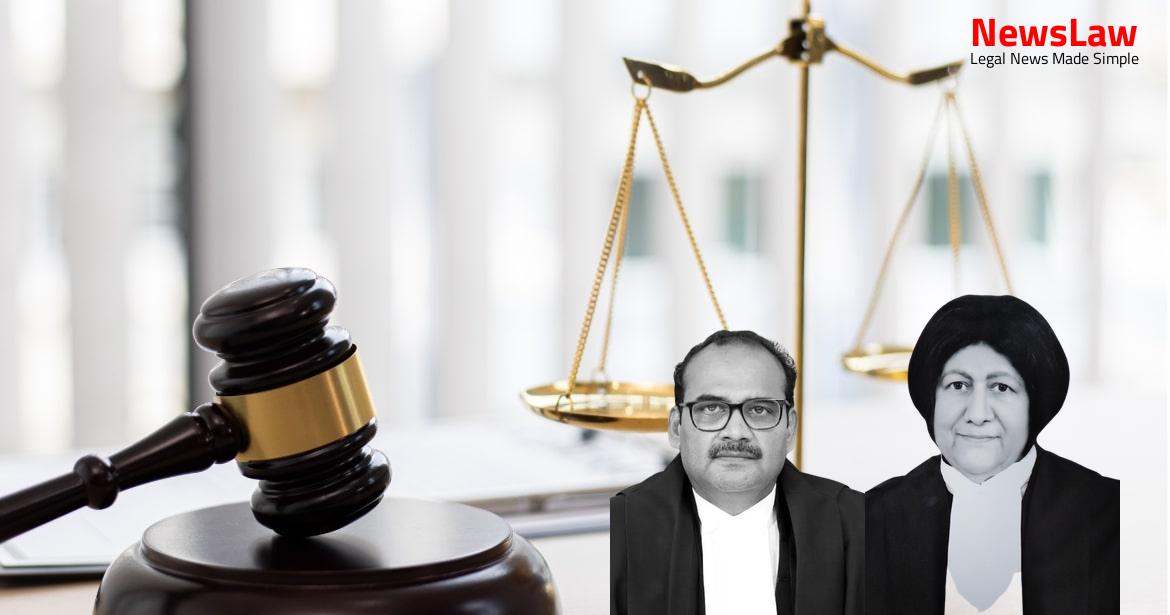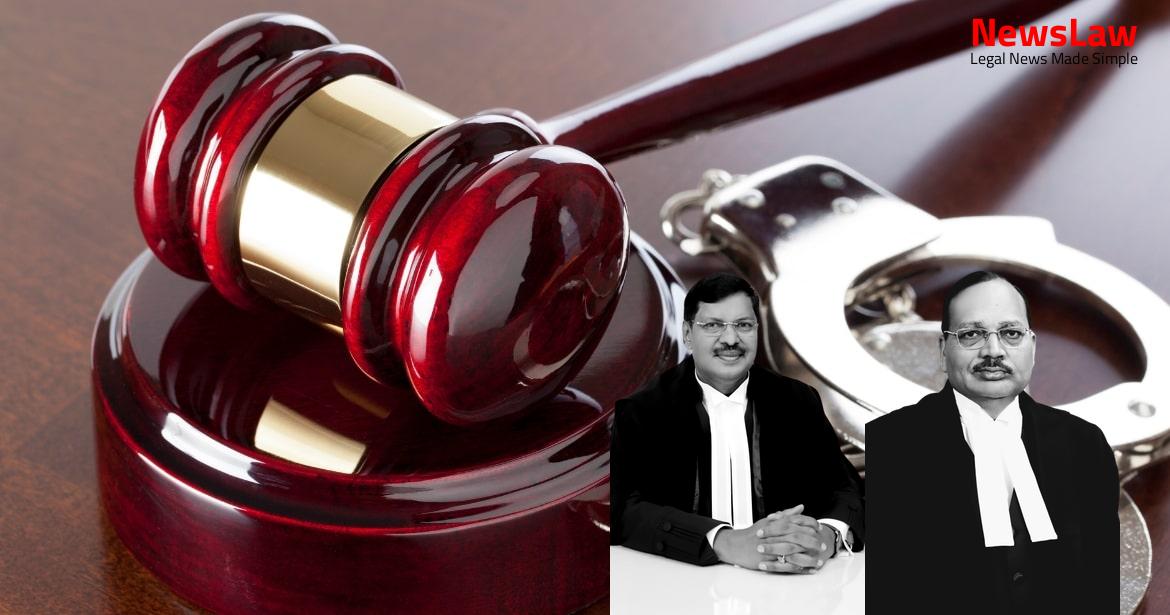Explore the intricate legal nuances surrounding Civil Court jurisdiction in our case analysis. The court’s in-depth legal analysis on matters such as rejection of plaints, constructive notice, and exemption arguments sheds light on the complexities of the case. Follow along to uncover the significance of these legal principles in determining the outcome of the suit.
Facts
- The plaintiffs filed a civil suit in S.C. Suit No.2343 of 1987 at the City Civil Court in Bombay.
- The suit sought to set aside an order passed by the Agricultural Lands Tribunal under Section 32G of the Maharashtra Tenancy and Agricultural Lands Act, 1948, and a sale certificate issued under Section 32M of the Act.
- The plaintiffs claimed to be legal representatives of Haji Ali Mohammed Hajee Kassam Agboatwala who passed away in 1946, leading to a suit for administration of his estate.
- Their previous plaint was rejected under Order VII Rule 11(d) CPC, and the rejection was confirmed by the High Court in a first appeal.
- Plaintiffs discovered sales through Agricultural Lands Tribunal and mutations in revenue records which were done without their knowledge.
- Upon inspection of records with the Court Receiver, the plaintiffs learned about these transactions.
- The High Court appointed a Receiver through a judgment dated 30.06.1950.
- The appeal was dismissed by the High Court of Judicature at Bombay on 26.02.2014.
- The City Civil Court Bombay allowed the notice of motion and rejected the plaint on both grounds raised by the second defendant in an order dated 16.04.2012.
- The plaintiffs filed a regular appeal in First Appeal No 948 of 2012 against the order of the City Civil Court.
Also Read: Interpretation of Will and Hindu Succession Act: Legal Analysis
Arguments
- Mr. Aniruddha Joshi argues that a party cannot resurrect its right to avail statutory remedies if it chose not to challenge an order from the ALT for over two decades.
- The appellants are said to have constructive notice of the proceedings under Section 32-G and the sale certificate issued under Section 32-M, as per the respondents’ counsel.
- The contention of Mr. Joshi overlooks a crucial aspect of the case set up by the plaintiffs, making it a triable issue that prevents the suit from being dismissed at the outset.
- Arguing for the Respondent, the learned counsel cites the following key decisions in support of their plea:
- Ram Niwas (Dead) vs Bano (Smt.) & Ors.
- Rajasthan Housing Board vs New Pink City Nirman Sahakari Samiti Limited & Anr.
- Murlidhar Bapuji Valve vs. Yallappa Lalu Chaugule
- Parvathathammal vs Sivasankara Bhattar And Others
Also Read: Land Compensation Redetermination Case
Analysis
- Section 85A outlines a two-stage procedure for Civil Courts when a suit is filed despite the jurisdictional bar in Section 85.
- The Court cannot dismiss a suit solely based on selective information from the plaint claiming constructive notice.
- Section 85-A in the Act presents a unique provision not commonly found in statutes barring Civil Court jurisdiction.
- The rejection of the plaint on grounds of limitation in this case is contested as the plaintiffs claim lack of notice.
- The case’s complexity is heightened by the Court Receiver’s involvement in tenancy proceedings without clear authorization.
- Constructive notice plea seems to be a belated defense by the respondents, contradicting earlier claims of actual notice.
- Section 85(2) mandates non-questioning of orders under the Act, but Section 85-A provides some leeway.
- The rejection of the plaint based on limitation is disputed as a party with no notice can challenge proceedings upon gaining knowledge.
- The Collector serves as the appellate authority under Section 74, and appeal or revision must be filed within 60 days as per Section 79.
- Conclusion: The rejection of the plaint on the grounds of limitation appears premature given the circumstances and lack of notice to the plaintiffs.
- Rejecting a plaint under Order VII Rule 11 is a drastic power that can terminate a civil action at the threshold
- The power is conferred on the Court to eliminate cases at an early stage
- The plea regarding the date on which the plaintiffs gained knowledge of the essential facts is crucial for determining the limitation of the suit.
- The information on when the plaintiffs became aware of key facts is important in deciding if the suit is time-barred or not.
- This was highlighted in the case of Chhotanben vs. Kiritbhai Jalkrushnabhai Thakkar by a three-member bench of the Court.
- A person is said to have notice of a fact when he actually knows that fact or would have known it, but for willful abstention from an enquiry or search he ought to have made, or gross negligence.
- The two ingredients of the relevant part of Section 3 of the Transfer of Property Act, 1882, regarding when a person is said to have notice, are matters of fact to be established through evidence.
- The Civil Court must determine whether the appointment of a Receiver for the administration of the Estate falls within the mandate of Section 88-B(1)(d).
- The plaintiffs allege collusion between the Court Receiver and Revenue authorities leading to the sale and mutation of the Estate without notice to interested parties.
- The case is built on claims of collusion and fraud.
- The question of fraud and collusion in the order of ALT and subsequent sale certificate cannot be decided by appellate or revisional authorities under the Act.
- Section 88-B(1)(d) exempts certain provisions of the Act for lands under temporary management by Civil, Revenue, or Criminal Courts until the title of rightful owners is decided.
- The veracity of the exemption argument was not tested in lower courts.
- The absence of consideration of the exemption goes to the root of the matter, indicating that Civil Court’s jurisdiction was not completely ousted.
- The Trial Court and High Court erred in rejecting the plaint under Order VII Rule 11(d).
- The appeal is allowed, Trial Court and High Court judgments are set aside, and the suit is restored to file with no cost order.
Also Read: Legal Analysis in Disciplinary Proceedings
Case Title: SALIM D. AGBOATWALA Vs. SHAMALJI ODDHAVJI THAKKAR (2021 INSC 486)
Case Number: C.A. No.-005641-005641 / 2021



